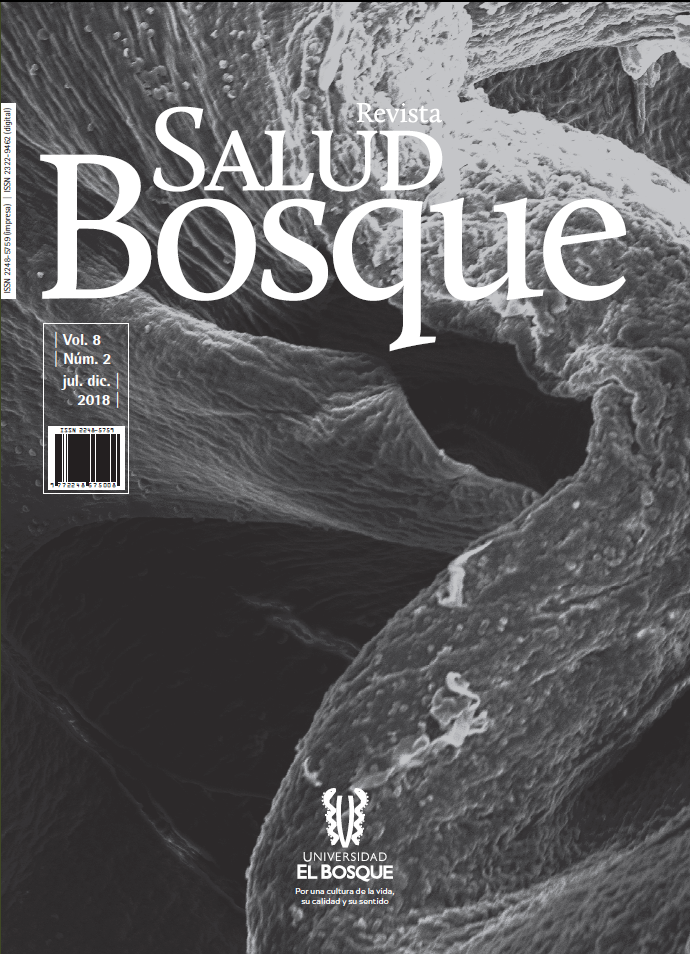Creencias y percepciones de pacientes y familiares o cuidadores sobre el cáncer
DOI:
https://doi.org/10.18270/rsb.v8i1.2478Keywords:
neoplasias, atención a la salud, diagnóstico precoz, pacientes, cuidadoresAbstract
Objective: Cancer is a complex phenomenon in which beliefs and perceptions of patients and carers are key in understanding ways of thinking and acting. This study aims at providing a starting point for further devising and implementing programs geared towards increasing patient participation and compliance to cancer-related treatments.
Tools and methods: A qualitative study was conducted with the participation of cancer patients and carers seeking care at the education center of a Colombian institution providing health
care to cancer patients (Instituto Nacional de Cancerología). Nine focus groups were carried out; Atlas Ti version 7.0 was used for data analysis. Further analysis was implemented with the use of discourse analysis
Results: This study was carried out with 88 participants; 39 patients and 49 carers. 71.5% of the sample accounted for women. Sociodemographic data indicated that 85% of the participants of this study were classified as having low or medium income. Throughout the present study, beliefs and perceptions about Cancer-related susceptibility, benefits and perceived barriers were identified. The findings of this study highlight risk factor perceptions and various barriers related to early diagnosis access.
Conclusion: Cancer – related prevention and early detection programs ought to include beliefs and perceptions within their scope, when devising information, education and communication strategies targeting communities, thus allowing for better outcomes in public health
Downloads
References
Organización Mundial de la Salud. Cáncer. Hechos clave. Febrero de 2018. Fecha de consulta: 2 de mayo de 2018. Disponible en: http://www.who.int/es/news-room/factsheets/detail/cancer
Organización Mundial de la Salud. Cáncer. Nota descriptiva. Febrero de 2017. Fecha de consulta: 31 de enero de 2018. Disponible en: http://www.who.int/cancer/about/facts/es/
Organización Mundial de la Salud. Programas nacionales de control del cáncer: políticas y pautas para la gestión. Segunda edición. Washington, D.C.: OPS; 2004.
Shahab L, McGowan J, Waller J & Smith S. Prevalence of beliefs about actual and mythical causes of cancer and their association with socio-demographic and health-related characteristics: Findings from a cross-sectional survey in England. Eur. J Cancer. 2018; Apr 26. pii: S0959-
(18)30778-0 doi.org/10.1016/j.ejca.2018.03.029
Masoudiyekta L, Rezaei-Bayatiyani H, Dashtbozorgi B, Gheibizadeh M, Malehi AS, Moradi M. Effect of education based on health belief model on the behavior of breast cancer screening in women. Asia Pac J Oncol Nurs.
;5:114-20.
The Economist Intelligence Unit. Control del cáncer, acceso y desigualdad en América Latina. Una historia de luces y sombras, 2017. Fecha de consulta: 28 de febrero de 2018. Disponible en: http://www.eiuperspectives.economist.com/sites/default/files/images/Cancer_control_access_and_inequality_in_Latin_America_SPANISH.pdf.
Moreno San Pedro E, Gil Roales-Nieto J. El modelo de creencias de salud: revisión teórica, consideración crítica y propuesta alternativa. Int J Psychol Psychological Ther. 2003;3:91-109.
Guibert-Reyes WG. Procesos psicosociales en la educación en salud. Revista Cubana de Medicina General Integral. 2000;16:186-93.
Universidad de Murcia. La percepción. Sf. Fecha de consulta: 21 enero de 2018. Disponible en: http://www.um.es/docencia/pguardio/documentos/percepcion.pdf.
Vargas-Melgarejo LM. Sobre el concepto de percepción. Alteridades. 1994;4:47-53. Fecha de consulta: 31 de mayo de 2018 Disponible en: http://www.redalyc.org/articulo.oa?id=7471135300.
Salazar L, Benavides M, Puerto D. Aproximaciones desde las ciencias de la complejidad y la historia de la acción institucional en salud pública para el control del cáncer. Revista Salud Bosque. 2016;6:45-54.
Rosenstock MI. Historical origins of the health belief model. Health Education Monographs.1974;2:328-35.
Blackwell B. The literature of delay in seeking medical care for chronic illnesses. Health Education Monographs.1963; 16:3-31.
Green LW, Roberts B. The research literature on why women delay in seeking medical care for breast symptoms. Health Education Monographs.1974;2:129-77.
Hamui-Sutton A, Varela-Ruiz M. La técnica de grupos focales. Investigación en Educación Médica. 2013;2:55-60.
Korman H. The focus group sensing. New York: Dept. of Sociology: SUNY at Stony Brook; 1986.
Jerônimo AF, Freitas ÂG, Weller M. Risk factors of breast cancer and knowledge about the disease: An integrative revision of Latin American studies. Ciên Saúde Colet. 2017;22:135-49. Disponible en: http://dx.doi.org/10.1590/1413-81232017221.09272015
Pedersen AF, Forbes L, Brain K, Hvidberg L, Wulff N, Lagerlund M & Vedsted, P .Negative cancer beliefs, recognition of cancer symptoms and anticipated time to help-seeking: An international cancer benchmarking partnership (ICBP) study. BMC Cancer. 2018;18:363.
Prieto-Rodríguez M, Gil-García E, Heierle-Valero C, Frías-Osuna A. La perspectiva de las cuidadoras informales sobre la atención domiciliaria: un estudio cualitativo con ayuda de un programa informático. Revista Española de Salud Pública. 2002;76:613-25.
Bona DV. Impacto económico de cáncer pediátrico avanzado en las familias. J Pain Symptom Manage. 2014;47:594-603.
Torres X, Carreño S, Chaparro L. Factores que influencian la habilidad y sobrecarga del cuidador familiar del enfermo crónico. Revista de la Universidad Industrial de Santander. 2017;49:330-8.
Gil Roales-Nieto J. Manual de psicología de la salud. Aproximación histórica y conceptual. Granada: Némesis;1997.
Hamilton JG, Waters EA. How are multifactorial beliefs about the role of genetics and behavior in cancer causation associated with cancer risk cognitions and emotions in the US population? Psycho‐Oncology. 2018;27:640-7.
Pedersen AF, Vedsted P. Cancer beliefs in cancer survivors, cancer relatives and persons with no cancer experience. Scand J Public Health. 2017:1403494817715380.
Aresca LB. Psicooncología. Diferentes miradas. Buenos Aires: Editorial Lugar; 2004; 96-97
Nigenda G, Caballero M, & González-Robledo L. Barreras de acceso al diagnóstico temprano del cáncer de mama en el Distrito Federal y en Oaxaca. Salud Pública de México. 2009;51:254-62.
Flórez-Alarcón L. Psicología social de la salud. Promoción y prevención. Bogotá: El Manual Moderno; 2007; 94.











